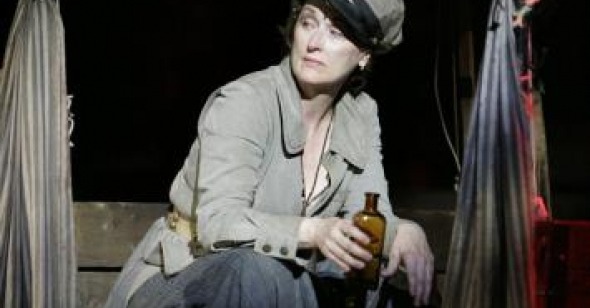From a Distance
by Chris Wisniewski
Theater of War
Dir. John Walters, U.S., White Buffalo Entertainment
“We all live off the war, whether or not we acknowledge it,” Meryl Streep explains at the start of John Walters’ handsome, messy documentary Theater of War. “She’s just more dirty and in the trenches. But we all live off the war.” The she, in this case, is Mother Courage, the titular character from Bertolt Brecht’s epic play, which was retranslated by Tony Kushner and staged in 2006 by the Public Theater with Streep in the lead role. Streep’s sentiment is appropriately Brechtian in spirit—if we wish to judge Mother Courage for trying to make a profit from the Thirty Years War we must also realize that we, too, profit in some measure from wars in Iraq and Afghanistan. Though Walters tries a little too hard throughout his film to connect Mother Courage and Her Children to our fraught political moment (a dubious exercise, since Brecht himself deliberately avoided contemporaneous political intervention by setting his play three centuries in the past), Streep’s brief, cynical aside manages to make the point far better than most of what follows—the stock footage of antiwar protests or newspaper clippings about Iraq or Kushner tut-tutting about Israel’s invasion of Lebanon. This is because Streep, like Brecht, reminds us with cold clarity that we are all a part of a system that feeds on suffering and death, a system that makes each of us complicit in violence and war.
The Public Theater production of Mother Courage functions as a starting point for Walters’s sprawling look at the history and meaning of the play. He divides his film into five loosely structured thematic acts (e.g., “Marx and Coca Cola”, “In Search of Bertolt Brecht”) that cover, among other subjects, Brecht’s discovery of Marxism, his inspiration in writing the play, the original 1949 production of the show in Berlin, and the relevance of Mother Courage to the contemporary political landscape. This is an admirably ambitious intellectual agenda for any documentary, but even setting aside the film’s structural problems—it jumps from thread to thread and theme to theme without a clear sense of direction—Walters has probably set out to cover too much ground.
The movie is driven by a restless curiosity, but it occasionally suffers from a corresponding superficiality. In one sequence, Walters cuts between a lecture on Marx by novelist Jay Cantor (the movie’s academic talking-head-in-chief) and a prop builder constructing sets for the show. While I’m thrilled to see The Marx-Engels Reader make a cameo appearance, I was left wondering what Walters meant to say about Marx—or prop building—by making the comparison, though I’m fairly certain it had nothing to do with alienation, false consciousness, or the prop builder’s species being. At the end of the film, Cantor wonders if it matters that Brecht was a Marxist and equivocates. Initially, he insists that it does matter (and on this point, I’m inclined to agree), but when he turns to the issue of Mother Courage, he downplays the significance of Marxism to the play’s moral and aesthetic project. Cantor’s equivocation is similar to Walters’: Theater of War takes the specificity of the play’s intellectual and political project seriously but strains to universalize its themes and ideas. Admittedly, this is a challenge with Brecht: in the face of the failure of the Marxist political project, what can we extract from the work of one of the twentieth century’s greatest playwrights, and in this instance, arguably the century’s greatest play? Walters succeeds best when he narrows his scope to Brecht and his play. When he treats Mother Courage as a master text for twentieth century warfare, Theater of War feels like a hodgepodge.
If the movie takes the form of an essay film, it’s also a document of the 2006 Mother Courage production and the creative process behind it. Streep has never before allowed anyone to shoot her rehearsals—in the film, she likens it to trying to sell a house by showing potential buyers the plumbing—but it’s wondrous to see the actress at work, burrowing into Courage and building her performance one line reading at a time. She’s also an engaging presence in interviews, reflecting on her character and her role as an actor with considered intelligence.
The Streep material alone would be enough to recommend Theater of War, but Walters has also included a few terrific sequences in which he reconstructs scenes from the play by cutting among rehearsals, footage from the 2006 production, and voiceovers from the original Berlin production starring Brecht’s wife, Helene Weigel, illustrated with photographs of the show. These brief scenes achieve something Walters’ talking heads never manage: while respecting the historical specificity of 1949 Berlin and 2006 New York, they reveal Mother Courage and Her Children’s relevance to both moments. Streep describes the play as “a living thing…an organism.” And it’s then, as Walters jumps between decades using Brecht as his guide, that this is made thrillingly palpable.
